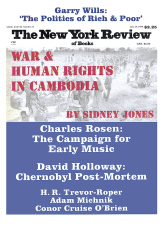In response to:
The Morality of Journalism from the March 1, 1990 issue
To the Editors:
Janet Malcolm’s article, “The Morality of Journalism,” in your issue of March I took my breath away. She claims that it is standard journalistic practice—and moral, too—to clean up spoken quotations to make them grammatical and economical even if this means that they are not “identical with their speech counterparts.”
From my experience as a journalist and biographer on both sides of the Atlantic, the very opposite is true. Why does Ms. Malcolm think that serious newspapers, magazines and books are full of the bracketed “[sic],” “[that]” and “[he],” or the equally eye-stopping “…” indicating ellipsis? To help the flow of the writer’s prose?
Hardly. The ugly insertions are among the devices used to indicate where the quoted material departs from the source.
The reader has the right to believe that what is contained in any quotation marks are the actual words of the person being quoted—even when the words derive from tape-recorded conversation. If the subject of an interview rambles on, a writer is free to close the quote and continue with indirect discourse or interpretation, but never to invent. Tabloid press aside, journalists and editors, I had always thought, agree on the principle that comment is free but quotes are sacred.
Brenda Maddox
London, England
Janet Malcolm replies:
Of course, it is out of the question for journalists, biographers, and other writers of nonfiction to invent quotations. As I myself wrote, “When we read a quotation in a work of journalism, we assume it to be a rendering of what the speaker actually—not probably—said. The idea of a reporter inventing rather than reporting speech is a repugnant, even sinister one.” But I have trouble with two points in Ms. Maddox’s letter.
First, it isn’t true that newspapers and nonfiction books are “full” of brackets and ellipsis marks. When they appear it is usually within quotations from written texts or from tape transcripts published as such. Otherwise, by convention, most quoted speech in nonfictional writing is rendered without brackets or ellipsis marks, as in fiction. This has nothing to do with invention, only with convention.
Second, Ms. Maddox’s comment that “The reader has the right to believe that what is contained within any quotation marks are the actual words of the person being quoted—even when the words derive from tape-recorded conversation,” causes me to fear that she didn’t read my essay. My point—one which I bore down on heavily—was that only when the words derive from tape-recorded conversations can such a thing as “actual” or “literal” quotation be discussed and that—as the invention of the tape recorder surprisingly revealed—our actual utterances are usually couched in a language that urgently requires translation into English when it is transferred from oral to written speech. As we listen to each other speak, we make the translation automatically and thus think we are hearing English, but, as tape transcripts demonstrate, we are not. As we speak, we seem to be making constant stabs at saying what we mean—thus the redundancy, hesitancy, fragmentation that surround the occasional complete grammatical sentence we form and the occasional mot we get off. To publish a person’s tape-recorded speech verbatim is a little like publishing a writer’s rough drafts.
If Ms. Maddox misunderstood my (hardly radical or novel) point about the need for editing tape transcripts, there may be something else she has obscurely sensed better than I was able to at the time I wrote my essay, and that her letter now causes me to consider. This is the vexed problem of quotation for publication, which no amount of care in editing or punctiliousness about accuracy, or even literal transcription with the use of ellipsis marks and brackets, can wholly solve. People who are quoted in print are rarely, if ever, pleased with the result, even when they have given their prior approval. In making his selections from the vast wastes of loose talk that constitute the usual interview, the interviewer—at least in the opinion of the interviewee—almost invariably picks wrong. Whether the interviewer is a journalist, a nonfiction novelist, or a biographer, his agenda is not the same as that of the person he is interviewing, and his selections reflect this disparity of interest. An elegant solution to the interviewee’s problem devised by Vladimir Nabokov, who would only give interviews in writing—written questions submitted to him for written answers—obviously has limited application. But it may be the only way the interviewee has of protecting himself against his own words.
This Issue
July 19, 1990



